Thrilling Incidents In American History
• Preface
Revolutionary War
• Opening Of The Revolution
• The Boston Massacre
• Affair of the Sloop Liberty
• Affair of the Gaspee
• The Tea Riot
• The Boston Port Bill
• The First Continental Congress-Consequent Parliamentary proceedings
• Organization of the Minute-Men
• Patrick Henry-Second Provincial Congress-First Military Enterprise
• Battles of Lexington and Concord
• Battle of Bunker's Hill
• Capture of Ticonderoga
• Second Continental Congress-Washington's Appointment
• Siege of Boston
• Incidents at the Evacuation of Boston
• Burning of Falmouth
• Arnold's Expedition to Quebec
• Siege of Quebec, and Death of Montgomery
• Scenes at Quebec during the Siege
• Expedition against Charleston
• The Declaration of Independence
• The Battle of Long Island
• Washington's Retreat through New Jersey-Capture of General Lee
• Battle of Trenton
• Battle of Princeton
• Capture of General Prescott
• Battle of Brandywine
• Battle of Germantown
• Battle of Red-Bank
• Attack on Fort Mifflin-Retirement of the Army to Valley Forge
• Battle of Bennington
• Murder of Miss M'Crea
• Battle of Stillwater
• Battle of Bemis' Heights, and Retreat of Burgoyne
• Capture of Forts Clinton and Montgomery
• Surrender of Burgoyne
• The Treaty with France
• Attack on Savannah, and Death of Pulaski
• Storming of Stony Point
• General Sullivan's Campaign against the Mohawks
• Tarleton's Quarters
• Battle of Camden, and Death of De Kalb
• Arnold's Treason
• The Loss of the Randolph
• The British Prison-Ships
• Capture of the Serapis
• Putnam's Feat at Horseneck
• Battle of Eutaw Springs
• Wayne's Charge at Green Spring
• Capture of the General Monk
• The Mutinies
• Battle of the Cowpens
• Capture of New London
• Massacre of Wyoming
• Surrender of Cornwallis
War With France
• Capture of L'Insurgente
• The Constellation and Vengeance
War With Tripoli
• Burning of the Philadelphia
• Bombardment of Tripoli
• Loss of the Intrepid
• Expedition of General Eaton
Second War With England
• Battle of Tippecanoe
• Capture of the Guerriere
• Tragical Affair of an Indian Chief
• Battle and Massacre at the River Raisin
• Captain Holmes's Expedition
• Capture of the Caledonia and Detroit
• The Wasp and Frolic
• Gallant Conduct of Lieutenant Allen at the Capture of the Macedonian
• Capture and Destruction of the Java
• Siege of Fort Meigs
• Capture of York, and Death of General Pike
• Defence of Sackett's Harbour
• Defence of Fort Stephenson
• Battle of Lake Erie
• Battle of the Thames
• Gallant Action of Commodore Chauncey under the guns of Kingston Citadel
• The Sacking of Hampton
• Capture of the Peacock
• Massacre at Fort Mimms
• Surrender of Weatherford
• Battle of Niagara
• BattIe of New Orleans
War With Mexico
• Battle of Palo Alto
• Battle of Resaca de la Palma
• Capture of Monterey
• Battle in the Streets of Monterey
• Thrilling Scenes in the Battle of Buena Vista
• Bombardment of Vera Cruz
• Battle of Cerro Gordo
• Battles of Contreras and Churubusco
• Storming of Chapultepec

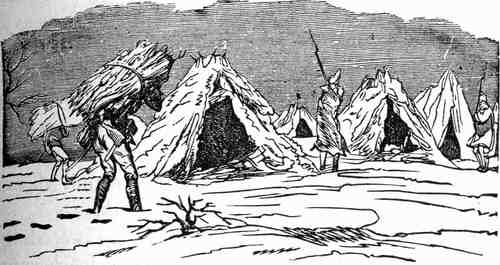
Encampment at Valley Forge.
ATTACK ON FORT MIFFLIN-RETIREMENT OF THE ARMY TO VALLEY FORGE.
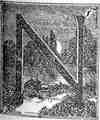 OTWITHSTANDING these misfortunes,
the operations requisite
for reducing the forts ou the river
were carried on with great activity.
Batteries were erected
on the Pennsylvania bank opposite
Mud Island; but from the
difficulty of constructing works
on marshy ground, and of transporting heavy artillery
through swamps, much time was consumed before
they could be got ready to act with effect. The
British also took possession of Province Island; and,
although it was almost wholly overflowed, erected
works upon it.
On the 15th of November, everything was ready
for a grand attack on Fort Mifflin. The Vigilant
armed ship and a hulk, both mounted with heavy
cannon, passed up the strait between Hog and Province
islands and the Pennsylvania bank, in order to
take their station opposite the weakest part of the
fort. The Isis, Somerset, Roebuck, and several
frigates, sailed up the main channel, as far as the
second line of chevaux-de-frise would permit them
and placed themselves in front of the work.
OTWITHSTANDING these misfortunes,
the operations requisite
for reducing the forts ou the river
were carried on with great activity.
Batteries were erected
on the Pennsylvania bank opposite
Mud Island; but from the
difficulty of constructing works
on marshy ground, and of transporting heavy artillery
through swamps, much time was consumed before
they could be got ready to act with effect. The
British also took possession of Province Island; and,
although it was almost wholly overflowed, erected
works upon it.
On the 15th of November, everything was ready
for a grand attack on Fort Mifflin. The Vigilant
armed ship and a hulk, both mounted with heavy
cannon, passed up the strait between Hog and Province
islands and the Pennsylvania bank, in order to
take their station opposite the weakest part of the
fort. The Isis, Somerset, Roebuck, and several
frigates, sailed up the main channel, as far as the
second line of chevaux-de-frise would permit them
and placed themselves in front of the work.
The little garrison of Fort Mifflin, not exceeding three hundred men, had greatly exerted themselves in opposing and retarding the operations of the British fleet and army against them; and in this desperate crisis their courage did not forsake them. A terrible cannonade against Fort Mifflin was begun and carried on by the British batteries and shipping; and was answered by the fort, by the American galleys and floating batteries on the river, and by their works on the Jersey bank. In the course of the day the fort was in a great measure demolished, and many of the guns dismounted. The garrison, finding their post no longer tenable, retired, by means of their shipping, during the night. Two days afterwards, the post at Red-Bank was evacuated also. Lord Cornwallis marched against it; but the garrison retreated before his arrival.
The American shipping in the river, being now left unprotected, retired up the stream: part of it, by keeping close to the Jersey side, passed the batteries at Philadelphia during the night, and escaped; the rest was set on fire, and abandoned. Even the part
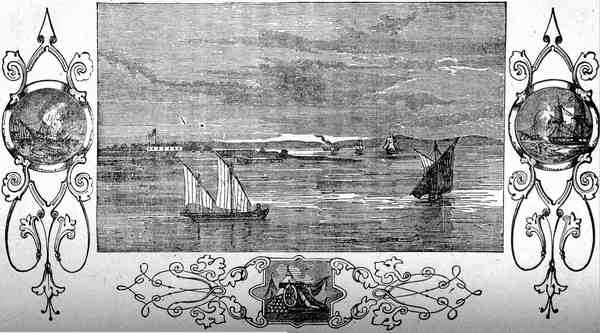
Fort Mifflin
of it, however, which escaped at this time, was afterwards destroyed. Thus the navigation of the Delaware was opened, and a free communication established between the fleet and army; but the defence of the river was so obstinate, that a considerable part of the campaign was spent in clearing it.
General Washington having received a reinforcement from the northern army, after the termination of the campaign in that quarter, left his strong camp at Skippach Creek, and, advancing nearer the British, occupied an advantageous position at White Marsh, fourteen miles from Philadelphia. He had a valley and rivulet in front, and his right was protected by an abattis, or fence of trees cut down, with their top branches pointed and turned outwards.
Sir William Howe thinking that General Washington, encouraged by his reinforcements, would hazard a battle for the recovery of the capital of Pennsylvania, or that a successful attack might be made on his position, marched from Philadelphia on the evening of the 4th of December, and next morning took post on Chestnut Hill, in front of the right wing of the American army. During the two succeeding days, General Howe made several movements in front of Washington's encampment and some skirmishing ensued. But General Washington remained within his lines; and Sir William Howe, deeming it unadvisable to attack him there, and seeing no probability of being able to provoke him to engage on more equal terms, returned with his army, on the 8th of December, to Philadelphia. At that time the two armies were nearly equal in point of numerical force, each consisting of upwards of fourteen thousand men. Soon afterwards General Washington quitted White Marsh, crossed the Schuylkill, and took post at Valley Forge, where he spent tile winter, about twenty-six miles from Philadelphia.
The sufferings of the army at Valley Forge were dreadful beyond description. Quartered in wretched tents, without clothing suitable fur the inclement season and without shoes, these heroic men bore all with a patience and courage which never ceased to command the eulogies of their countrymen. The example and exhort'tltions of Washington were incessantly exerted to keep up their spirits; and the greatness of the cause for which they were suffering, made them endure all without a murmur. In fact, the army was almost defenceless in the neighbourhood of a powerful enemy; but Providence destined them to rise from the clutches of the oppressor, and still achieve triumphs for the cause of liberty.
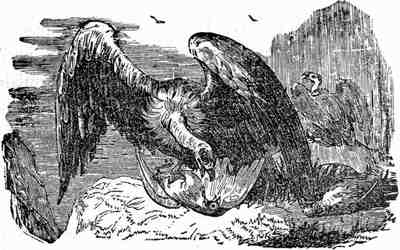
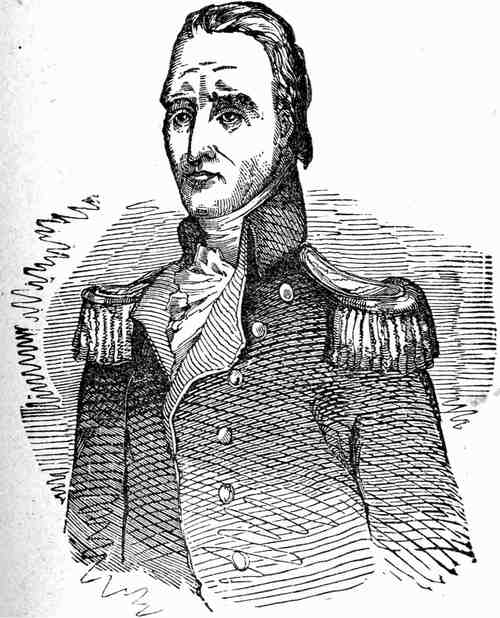
General Stark